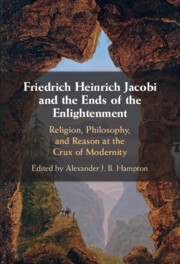 Friedrich Heinrich Jacobi and the Ends of the Enlightenment
Friedrich Heinrich Jacobi and the Ends of the Enlightenment Book contents
- Friedrich Heinrich Jacobi and the Ends of the Enlightenment
- Reviews
- Friedrich Heinrich Jacobi and the Ends of the Enlightenment
- Copyright page
- Dedication
- Epigraph
- Contents
- Contributors
- Foreword
- Acknowledgments
- Abbreviations
- Introduction
- Part I The Critique of Reason: Debates on Rationalism, Empiricism, and Skepticism
- Part II Faith and Revelation: Debates on Theism, Atheism, and Nihilism
- Part III Jacobi and the Revival of Socraticism: The Muenster Circle and Existentialism
- Part IV Jacobi’s Impact on Idealism and Romanticism
- Jacobi Sources
- Index
- References
Part I - The Critique of Reason: Debates on Rationalism, Empiricism, and Skepticism
Published online by Cambridge University Press: 09 February 2023
- Friedrich Heinrich Jacobi and the Ends of the Enlightenment
- Reviews
- Friedrich Heinrich Jacobi and the Ends of the Enlightenment
- Copyright page
- Dedication
- Epigraph
- Contents
- Contributors
- Foreword
- Acknowledgments
- Abbreviations
- Introduction
- Part I The Critique of Reason: Debates on Rationalism, Empiricism, and Skepticism
- Part II Faith and Revelation: Debates on Theism, Atheism, and Nihilism
- Part III Jacobi and the Revival of Socraticism: The Muenster Circle and Existentialism
- Part IV Jacobi’s Impact on Idealism and Romanticism
- Jacobi Sources
- Index
- References
Summary

- Type
- Chapter
- Information
- Friedrich Heinrich Jacobi and the Ends of the EnlightenmentReligion, Philosophy, and Reason at the Crux of Modernity, pp. 7 - 84Publisher: Cambridge University PressPrint publication year: 2023
